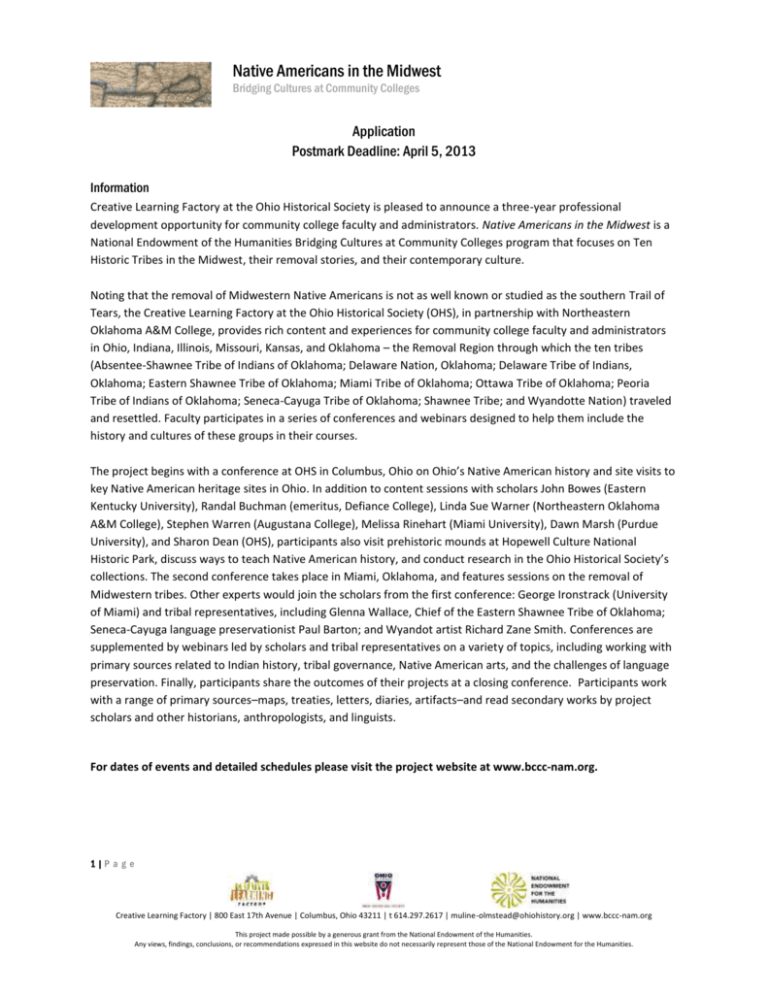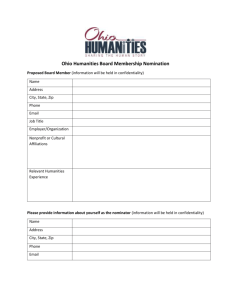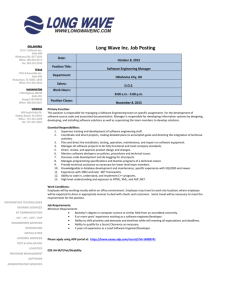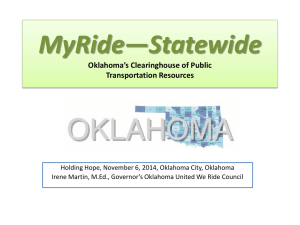Native Americans in the Midwest Bridging Cultures at Community
advertisement

Native Americans in the Midwest Bridging Cultures at Community Colleges Application Postmark Deadline: April 5, 2013 Information Creative Learning Factory at the Ohio Historical Society is pleased to announce a three-year professional development opportunity for community college faculty and administrators. Native Americans in the Midwest is a National Endowment of the Humanities Bridging Cultures at Community Colleges program that focuses on Ten Historic Tribes in the Midwest, their removal stories, and their contemporary culture. Noting that the removal of Midwestern Native Americans is not as well known or studied as the southern Trail of Tears, the Creative Learning Factory at the Ohio Historical Society (OHS), in partnership with Northeastern Oklahoma A&M College, provides rich content and experiences for community college faculty and administrators in Ohio, Indiana, Illinois, Missouri, Kansas, and Oklahoma – the Removal Region through which the ten tribes (Absentee-Shawnee Tribe of Indians of Oklahoma; Delaware Nation, Oklahoma; Delaware Tribe of Indians, Oklahoma; Eastern Shawnee Tribe of Oklahoma; Miami Tribe of Oklahoma; Ottawa Tribe of Oklahoma; Peoria Tribe of Indians of Oklahoma; Seneca-Cayuga Tribe of Oklahoma; Shawnee Tribe; and Wyandotte Nation) traveled and resettled. Faculty participates in a series of conferences and webinars designed to help them include the history and cultures of these groups in their courses. The project begins with a conference at OHS in Columbus, Ohio on Ohio’s Native American history and site visits to key Native American heritage sites in Ohio. In addition to content sessions with scholars John Bowes (Eastern Kentucky University), Randal Buchman (emeritus, Defiance College), Linda Sue Warner (Northeastern Oklahoma A&M College), Stephen Warren (Augustana College), Melissa Rinehart (Miami University), Dawn Marsh (Purdue University), and Sharon Dean (OHS), participants also visit prehistoric mounds at Hopewell Culture National Historic Park, discuss ways to teach Native American history, and conduct research in the Ohio Historical Society’s collections. The second conference takes place in Miami, Oklahoma, and features sessions on the removal of Midwestern tribes. Other experts would join the scholars from the first conference: George Ironstrack (University of Miami) and tribal representatives, including Glenna Wallace, Chief of the Eastern Shawnee Tribe of Oklahoma; Seneca-Cayuga language preservationist Paul Barton; and Wyandot artist Richard Zane Smith. Conferences are supplemented by webinars led by scholars and tribal representatives on a variety of topics, including working with primary sources related to Indian history, tribal governance, Native American arts, and the challenges of language preservation. Finally, participants share the outcomes of their projects at a closing conference. Participants work with a range of primary sources–maps, treaties, letters, diaries, artifacts–and read secondary works by project scholars and other historians, anthropologists, and linguists. For dates of events and detailed schedules please visit the project website at www.bccc-nam.org. 1|P a g e Creative Learning Factory | 800 East 17th Avenue | Columbus, Ohio 43211 | t 614.297.2617 | muline-olmstead@ohiohistory.org | www.bccc-nam.org This project made possible by a generous grant from the National Endowment of the Humanities. Any views, findings, conclusions, or recommendations expressed in this website do not necessarily represent those of the National Endowment for the Humanities. Native Americans in the Midwest Bridging Cultures at Community Colleges Who Should Apply Applicants should be community college faculty or administrators teaching in the humanities in Ohio, Indiana, Illinois, Missouri, Kansas, or Oklahoma with an interest in Native American history or studies and a desire to implement new courses about Native American history or studies or enhance existing courses with Native American content. Participants must be able to attend all scheduled activities over the three-span of the project. Please ensure that you are able to attend all activities before submitting your application. Applicants must have a letter of support from their department chair or dean identifying that they will have the opportunity and support to participate in the program as well as develop and teach new content and courses at their college. Full-time faculty members, part-time lecturers, adjunct faculty, and administrators at American community colleges are eligible to participate. An applicant need not have an advanced degree in order to qualify. Applicants must be United States citizens, residents of U.S. jurisdictions, or foreign nationals who have been residing in the United States or its territories for at least the three years immediately preceding the application deadline. Application Package Includes: 1. 2. 3. 4. 5. 6. Application Sheet (see page 3). Please fill out an NEH Applicant/Participant Information Sheet (Applicants must complete the NEH Applicant/Participant Information Sheet to be considered eligible) https://securegrants.neh.gov/bccc/applications/ Two-page CV Syllabus of a humanities course you currently teach Three-page essay describing: Your interest in participating in the program, including shared research interests and issues related to your community college campus or system, How the program will impact humanities teaching both in your classroom as well as across your campus or system, and A proposed research topic based on the topics to be discussed over the course of the program that you intend to develop into a new course or use to enhance an existing course. For more information on topics please view the project website: www.bccc-nam.org Letter of Support from their department chair or dean identifying that they will have the opportunity and support to participate in the program as well as develop and teach new content and courses at their college. Postmark Deadline: Please mail one copy of all application materials in hard copy (only hard copies will be considered) by April 5th, 2013 to the address below. Questions? Please contact: Molly Uline-Olmstead, Project Director 800 East 17th Avenue Columbus, Ohio 43211 t. 614.297.2617 | muline-olmstead@ohiohistory.org 2|P a g e Creative Learning Factory | 800 East 17th Avenue | Columbus, Ohio 43211 | t 614.297.2617 | muline-olmstead@ohiohistory.org | www.bccc-nam.org This project made possible by a generous grant from the National Endowment of the Humanities. Any views, findings, conclusions, or recommendations expressed in this website do not necessarily represent those of the National Endowment for the Humanities. Native Americans in the Midwest Bridging Cultures at Community Colleges Application Sheet Name: Home Address: City: State: Zip: State: Zip: Community College Name: Work Address: City: Phone 1: Phone 2: Email: Email will be primary mode of communication. Name and Brief Description of Current Courses Taught (use back of sheet if needed): Course One: Course Two: Course Three: Course Four: Average Number of Course Taught Annually: Average Number of Students Per Course: By signing this document I commit, if selected, to participate fully in all aspects of this project throughout the project period (August 2013 – August 2015). Signature Date 3|P a g e Creative Learning Factory | 800 East 17th Avenue | Columbus, Ohio 43211 | t 614.297.2617 | muline-olmstead@ohiohistory.org | www.bccc-nam.org This project made possible by a generous grant from the National Endowment of the Humanities. Any views, findings, conclusions, or recommendations expressed in this website do not necessarily represent those of the National Endowment for the Humanities.




